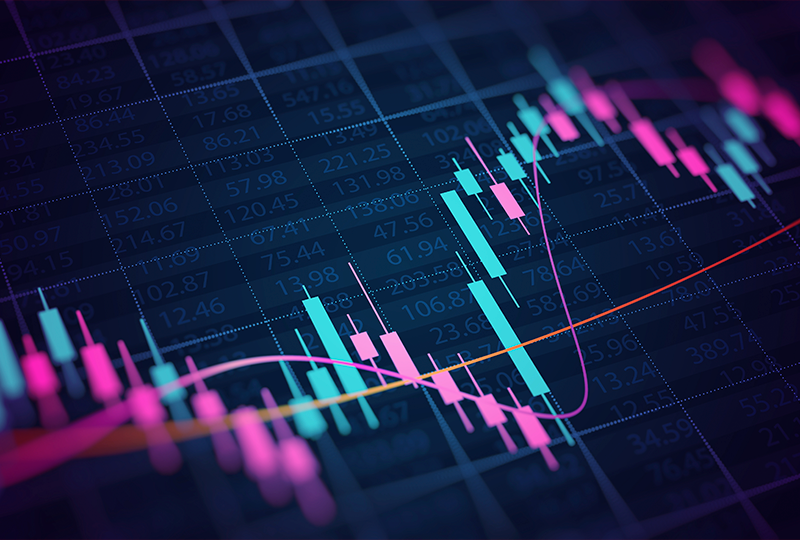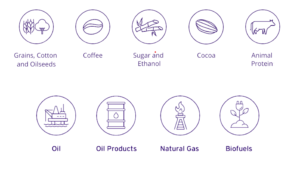
The financial market offers a wide variety of perspectives and possibilities. The more you search for information, the more you discover that there are goo

The financial market offers a wide variety of perspectives and possibilities. The more you search for information, the more you discover that there are good opportunities to invest in, take care of your money, make it yield, while also protecting you from unforeseen events.
In this universe, there are many strategies, and it’s necessary to have vast knowledge to choose which path is the best to follow. But there’s one thing in common for every business: Nobody wants to lose money or see their assets devalued.
At this point, hedging appears as a risk management strategy that can be interesting for anyone who has business related to commodity markets. They’re at the mercy of different volatilities, resulting from changing rates, exchange rate variations, unstable political and economic scenarios, unpredictable and inclement weather and climate change, as natural phenomena directly interfere with price fluctuations.
Thus, the need arises to find ways to protect your financial operations—that’s where hedging appears as a good possibility.
The English word “hedge” can literally be translated as “fence” or “boundary.” That’s how we call this trading model that guarantees protection against market fluctuations.
In practice, hedging is a mechanism that operates as a kind of insurance against price variations, reducing transaction risks in the market. A strategy of this nature aims to offer predictability to those who have any price exposure.
There are a few ways to apply hedging as a strategy. In the case of commodities, for example, the most common way to use this technique is to buy and/or sell futures contracts. In this case, a producer, for instance, is able to set a fixed price for their goods, supported by analysis of the current time, and forecasts for the near future.
Thus, the amount agreed will be paid in the future when the product is delivered. But, since the amount is already fixed, it’s possible to have a better idea of future earnings, and more financial stability as a result.
For the economy, and for the final consumer, it won’t cause any harm, as it also helps prevent prices from rising too high in case of product shortages.
This is one type of market where this strategy is most used. One of the great difficulties in fixing prices and achieving stability, when working in the agribusiness chain, is the unpredictability of the weather: droughts, excessive rain, cold and frost, too much heat for long periods. That’s to say that whenever there’s climatic imbalance, there’s also the possibility of loss—in particular, losses for agricultural producers and ranchers.
But there are other factors that influence commodity prices: the political and economic scenarios in Brazil and in the countries, we trade with (including wars, elections, and international agreements), exchange rate variations involving foreign currencies (specifically in the countries where the exports or inputs are imported), and natural phenomena in competing countries (like hurricanes and earthquakes), among others.
In other words, there are plenty of reasons for commodity markets to aim at more predictable terrain for its future trades.
Commodities are products originating from the economy’s primary sector. That is, they’re basic goods, mostly sold as they are, or with little processing. Some of the main ones are:

In any type of commodity—whether listed above or not—a hedging strategy can be used, as it involves the financial transaction and not the product itself (so much so that hedging is also used in other important markets, such as foreign exchange and stocks).
So, regardless of which crop, and at which stage of the chain it happens, it’s possible to use hedging to gain more peace of mind.
Hedging techniques are recommended for all those who’re exposed to price risks, and those who’d like to reduce the chances of loss and damage that arise as a result. This is the case for those who produce physical assets, like everyone who operates in commodity chains, and who need to manage protection against price variations, fluctuating exchange rates, and volatility in general.
Those who work with foreign currency trading are commonly exposed to exchange rate variations, and even in national scenarios, with so much political and economic instability, it’s an alternative that gives solidity.
There are relatively simple structures focused on different asset dimensions. Thus, for managers with limited experience to entrepreneurs who carry out large transactions, everyone can enter this universe in search of a tool to gain more security.
You can see that hedging is related to futures markets, right? This means that there are definitions made now for purchases and sales that will only happen later on.
Futures markets are similar to a stock exchange environment focused on futures or buying and selling trading contracts. This “space” allows values to be locked in for transactions that have yet to be carried out, but with dates and values defined in advance.
So hedging is a technique based on futures markets, but they aren’t the same thing. Hedging is a trading strategy that aims to protect money and future earnings. The futures market is the environment where this happens.
Creating a good hedging strategy can be the key to avoiding unpleasant surprises in your financial schedule. But it’s not enough to just decide to use any form of hedging without prior knowledge or study.
The best way to enter this universe is to have a partner that has a vast understanding of financial markets, and at the same time, agricultural markets in particular. Only with a broad view of such a complex context and global markets is it be possible to make the best decisions.
hEDGEpoint combines the knowledge of agro market experts with risk management solutions through technology, and customized Consulting, to always offer you the best experience in futures operations.
We’re present on five continents, and always ready to serve you—anytime and anywhere.
Contact a consultant to learn more about how to use this hedging instrument in your business.
Talk with a hEDGEpoint specialist.

Rua Funchal, 418, 18º andar - Vila Olímpia São Paulo, SP, Brasil
Contato
(00) 99999-8888 example@mail.com
Section
Home
O que Fazemos
Mercado
Quem Somos
HUB
Blog
Esta página foi preparada pela Hedgepoint Schweiz AG e suas afiliadas (“Hedgepoint”) exclusivamente para fins informativos e instrutivos, sem o objetivo de estabelecer obrigações ou compromissos com terceiros, nem de promover uma oferta ou solicitação de oferta de venda ou compra de quaisquer valores mobiliários, commodity interests ou produtos de investimento.
A Hedgepoint e suas associadas renunciam expressamente a qualquer uso das informações contidas neste documento que direta ou indiretamente resulte em danos ou prejuízos de qualquer natureza. As informações são obtidas de fontes que acreditamos serem confiáveis, mas não garantimos a atualidade ou precisão dessas informações.
O trading de commodity interests, como futuros, opções e swaps, envolve um risco substancial de perda e pode não ser adequado para todos os investidores. Você deve considerar cuidadosamente se esse tipo de negociação é adequado para você, levando em conta sua situação financeira. O desempenho passado não é necessariamente indicativo de resultados futuros. Os clientes devem confiar em seu próprio julgamento independente e/ou consultores antes de realizar qualquer transação.
A Hedgepoint não fornece consultoria jurídica, tributária ou contábil, sendo de sua responsabilidade buscar essas orientações separadamente.
A Hedgepoint Schweiz AG está organizada, constituída e existente sob as leis da Suíça, é afiliada à ARIF, a Associação Romande des Intermédiaires Financiers, que é uma Organização de Autorregulação autorizada pela FINMA. A Hedgepoint Commodities LLC está organizada, constituída e existente sob as leis dos Estados Unidos, sendo autorizada e regulada pela Commodity Futures Trading Commission (CFTC) e é membro da National Futures Association (NFA), atuando como Introducing Broker e Commodity Trading Advisor. A Hedgepoint Global Markets Limited é regulada pela Dubai Financial Services Authority. O conteúdo é direcionado a Clientes Profissionais e não a Clientes de Varejo. A Hedgepoint Global Markets PTE. Ltd está organizada, constituída e existente sob as leis de Singapura, isenta de obter uma licença de serviços financeiros conforme o Segundo Anexo do Securities and Futures (Licensing and Conduct of Business) Act, pela Monetary Authority of Singapore (MAS). A Hedgepoint Global Markets DTVM Ltda. é autorizada e regulada no Brasil pelo Banco Central do Brasil (BCB) e pela Comissão de Valores Mobiliários (CVM). A Hedgepoint Serviços Ltda. está organizada, constituída e existente sob as leis do Brasil. A Hedgepoint Global Markets S.A. está organizada, constituída e existente sob as leis do Uruguai.
Em caso de dúvidas não resolvidas no primeiro contato com o atendimento ao cliente (client.services@hedgepointglobal.com), entre em contato com o canal de ouvidoria interna (ombudsman@hedgepointglobal.com – global ou ouvidoria@hedgepointglobal.com – apenas Brasil) ou ligue para 0800-8788408 (apenas Brasil).
Integridade, ética e transparência são valores que guiam nossa cultura. Para fortalecer ainda mais nossas práticas, a Hedgepoint possui um canal de denúncias para colaboradores e terceiros via e-mail ethicline@hedgepointglobal.com ou pelo formulário Ethic Line – Hedgepoint Global Markets.
Nota de segurança: Todos os contatos com clientes e parceiros são realizados exclusivamente por meio do nosso domínio @hedgepointglobal.com. Não aceite informações, boletos, extratos ou solicitações de outros domínios e preste atenção especial a variações em letras ou grafias, pois podem indicar uma situação fraudulenta.
“Hedgepoint” e o logotipo “Hedgepoint” são marcas de uso exclusivo da Hedgepoint e/ou de suas afiliadas. O uso ou reprodução é proibido, a menos que expressamente autorizado pela HedgePoint.
Além disso, o uso de outras marcas neste documento foi autorizado apenas para fins de identificação. Isso, portanto, não implica quaisquer direitos da HedgePoint sobre essas marcas ou implica endosso, associação ou aprovação pelos proprietários dessas marcas com a Hedgepoint ou suas afiliadas.
aA Hedgepoint Global Markets é correspondente cambial do Ebury Banco de Câmbio, de acordo com a resolução CMN Nº 4.935, DE 29 DE JULHO DE 2021, Artigo 14 do Banco Central do Brasil (BACEN).
Para mais informações sobre nosso parceiro, serviços disponíveis, atendimento e ouvidoria, acesse o link a seguir: https://br.ebury.com/